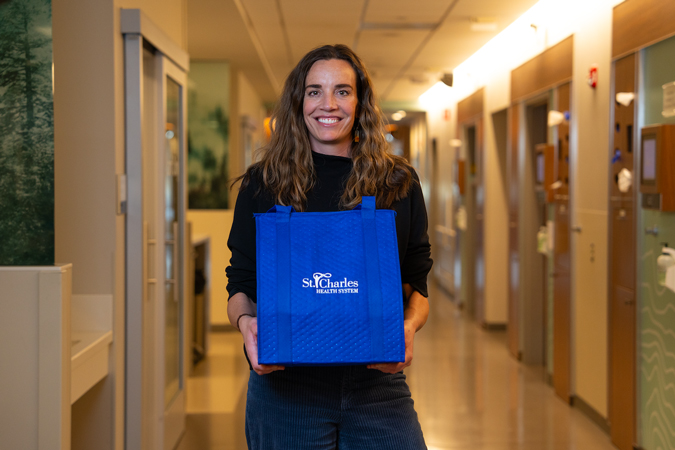Most people who contract respiratory syncytial virus (RSV) experience mild, cold-like symptoms, but for infants and the elderly the common respiratory virus can be much more serious.
“It can be a really severe illness, especially for babies under 3 months. It’s a tough virus and the littler you are, the littler your airways are. It doesn’t take a whole lot of mucous and infection for that to cause significant issues,” said Dr. Suzanne Mendez, pediatrician with St. Charles Health System, who treats infants hospitalized with RSV every year.
Last winter, Dr. Mendez and her colleagues on the Pediatric unit at St. Charles Bend noticed something unusual: they weren’t treating very many infants with RSV. St. Charles pediatrician Dr. Rebecca Jennings evaluated the data and verified that this was more than just a feeling: very few infants were hospitalized for RSV from November 2023 to March 2024. In fact, it was the lowest RSV season since tracking started in 2018, outside of the winter of 2020 at the height of the pandemic.
While the number of RSV cases fluctuates every year, Dr. Mendez and her colleagues believe there was another factor that likely helped contributed to the decline in cases: newly available vaccines and antibodies for RSV that protected infants. In 2023, two new methods to shield infants from RSV became available: pregnant patients could get an RSV vaccine, which would give immunity to their babies when born; and monoclonal antibodies were available to give to newborns directly to protect them from contracting RSV. Both are reported to have high efficacy for preventing RSV in infants.
“I believe these vaccines are working and helping to protect our vulnerable population of infants,” said Dr. Mendez. “And anecdotally for this past year, none of the babies with RSV on the Pediatric Unit were born to mothers who received the vaccine, so it appears to be very effective at preventing hospitalization.”
Dr. Sarah Hellmann, an OBGYN with St. Charles Center for Women’s Health, explains that about half of the pregnant patients she saw last year opted to receive the RSV vaccine and she’s hopeful that will increase this year as the vaccine and process become more widely known.
The CDC recommends a single dose of RSV vaccine for pregnant people from week 32 through week 36 of pregnancy for the prevention of RSV disease.
“You can certainly help protect babies with this vaccine,” said Dr. Hellmann, who shared that the RSV vaccine decreased the risk of severe cases of RSV in infants by 81% for the first 90 days of life.
RSV is one of several vaccinations recommended for pregnant patients to help boost immunity in newborns, including TDAP, COVID and flu.
“These vaccines are safe and decrease risks for babies,” said Dr. Hellmann.
RSV vaccines are available now for pregnant patients at St. Charles Center for Women’s Health. Contact 541-526-6635 for details.



